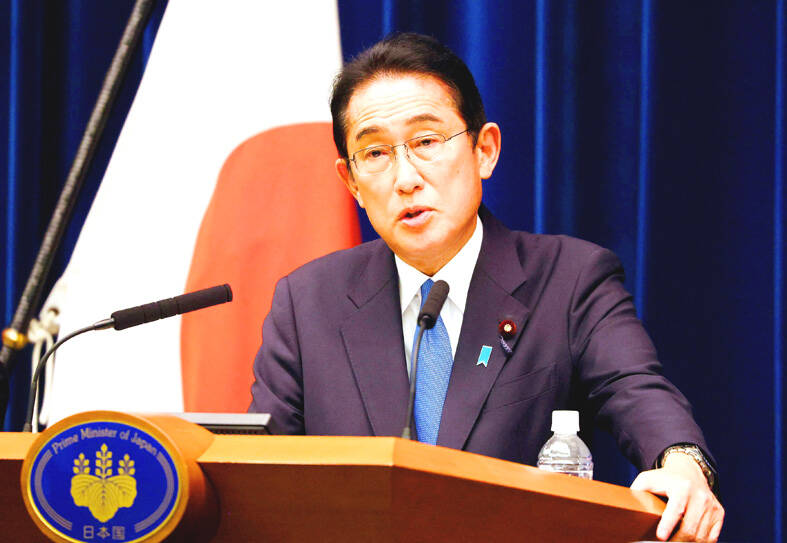Kishida’s Cabinet okays extra budget
HOUSEHOLDS SQUEEZED:
The US$198 billion extra budget is an attempt by the prime minister to stem the effects of inflation, but it would add to the nation’s debt burden
Japan’s Cabinet yesterday approved a ¥29.1 trillion (US$198 billion) extra budget to fund an economic stimulus package that aims to ease the impact of inflation on people and companies.
The second supplementary budget for the year ending in March next year would be partly funded by ¥22.9 trillion of government bond issuance, the Japanese Ministry of Finance said.
The latest plan adds to the nation’s already ballooning debt burden.

Photo: Reuters
“It’s important to seek both economic recovery as well as fiscal health,” Japanese Minister of Finance Shunichi Suzuki told reporters. “But we mustn’t hesitate to spend in times of crisis.”
The measures are largely an effort by Japanese Prime Minister Fumio Kishida to stem the impact of rising prices on households and businesses exacerbated by the slide in the yen to three-decade lows. Public discontent over inflation has helped push down Kishida’s popularity to levels that have put past administrations in danger.
“The big picture hasn’t changed in that the government continues to spend a lot of money and aims to boost tax revenue,” said economist Shunsuke Kobayashi at Mizuho Securities Co. “But some spending measures are just handing out money, which won’t lead to a sustainable increase of spending in the private sector like capital investments.”
Accelerating price gains have started to spread beyond energy, suggesting the inflation would last longer than first expected, but growth in paychecks has failed to keep up, eating into households’ ability to spend.
By providing some relief against higher costs, the prime minister is hoping to boost his support while enabling the Bank of Japan to continue with rock-bottom interest rates for longer, despite the impact of those policies on the currency.
The largest part of the extra spending, about one-quarter of the budget, would be used to boost price relief measures, including subsidies for electricity and gasoline, and measures to encourage companies to raise wages.
About one-fifth of the budget would provide funding for Kishida’s initiatives to spread wealth more widely. A further ¥7.5 trillion would fund measures to improve disaster resilience and cope with the changing national security environment.
The additional budget would be submitted to parliament, where it is likely to pass given Kishida’s ruling coalition majority.
Suzuki has said he aims to secure its passage by the end of this year.
By issuing more debt to fund the package, the government extends a spending spree that has accelerated during the COVID-19 pandemic.
Still, after a rejigging of issued bonds, including those for investment and loans, and a front-loading of other planned debt, the ministry has managed to limit the increase in the overall issuance of government bonds for this fiscal year to ¥4.5 trillion.
Efforts to keep additional issuance under a tight rein likely reflect the ministry’s concern to show the country’s rising debts are being kept under a certain degree of control.
Japan has the highest public debt load in the developed world and while it can largely rely on domestic takers for its debt issuance, including the central bank, policymakers are aware of the need to maintain market confidence in its fiscal discipline.
The recent collapse of former British prime minister Liz Truss’ government serves as a timely reminder of the perils of announcing massive spending plans without sufficiently thinking through all the funding requirements.
Still, one poll showed that more than half of Japanese want the Bank of Japan’s ultra-easy monetary policy reviewed as the yen struggles to hold up against the US dollar.
While the extra budget is set to fund measures to ease the impact of inflation, it also includes steps to try and make the best of the positive impacts from the weak yen, rather than trying to reverse the trend.
About ¥3.5 trillion of the budget is earmarked for strengthening regions’ ability to profit from the weaker currency and the potential for renewed inbound tourism.
Comments will be moderated. Keep comments relevant to the article. Remarks containing abusive and obscene language, personal attacks of any kind or promotion will be removed and the user banned. Final decision will be at the discretion of the Taipei Times.
Read More: Kishida’s Cabinet okays extra budget

